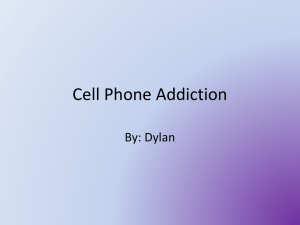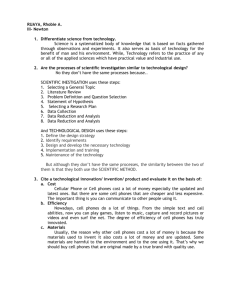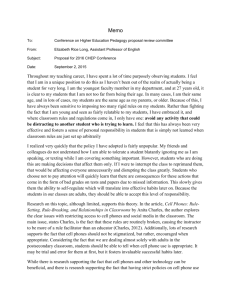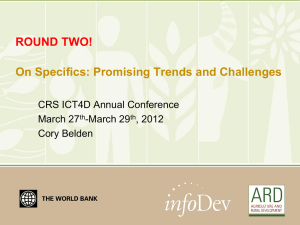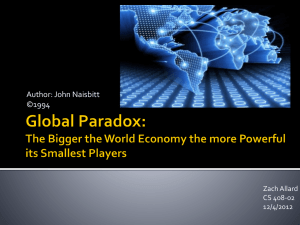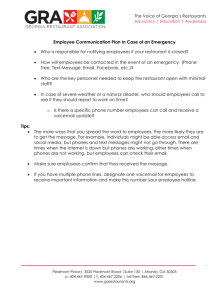mGovernment and eDemocracy
advertisement
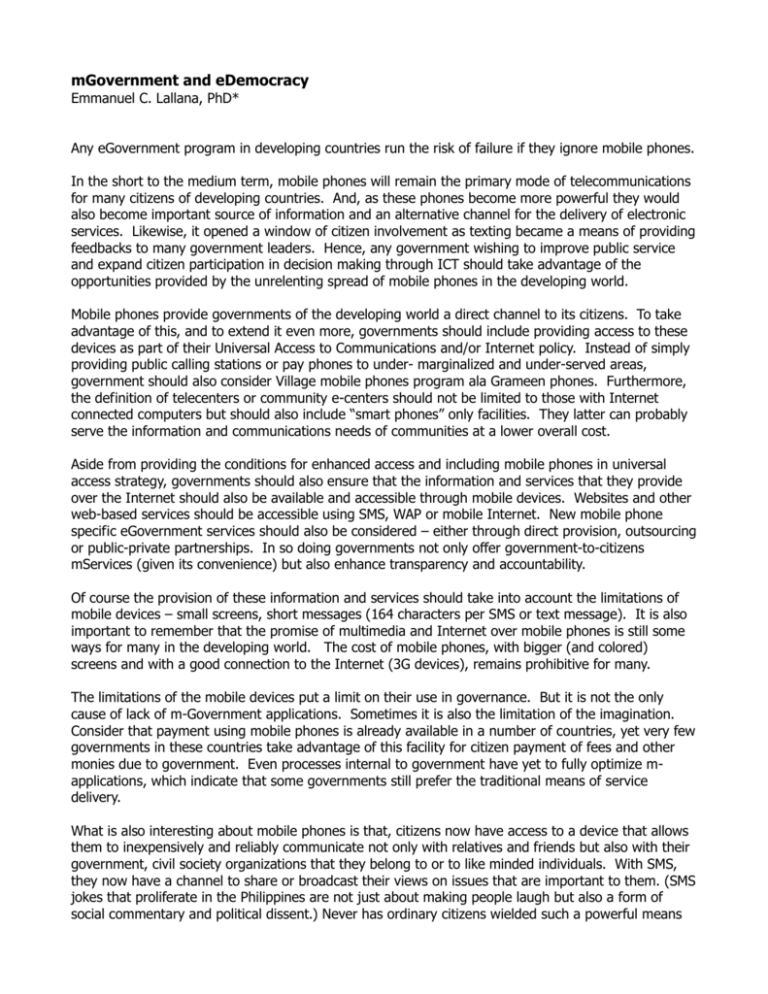
mGovernment and eDemocracy Emmanuel C. Lallana, PhD* Any eGovernment program in developing countries run the risk of failure if they ignore mobile phones. In the short to the medium term, mobile phones will remain the primary mode of telecommunications for many citizens of developing countries. And, as these phones become more powerful they would also become important source of information and an alternative channel for the delivery of electronic services. Likewise, it opened a window of citizen involvement as texting became a means of providing feedbacks to many government leaders. Hence, any government wishing to improve public service and expand citizen participation in decision making through ICT should take advantage of the opportunities provided by the unrelenting spread of mobile phones in the developing world. Mobile phones provide governments of the developing world a direct channel to its citizens. To take advantage of this, and to extend it even more, governments should include providing access to these devices as part of their Universal Access to Communications and/or Internet policy. Instead of simply providing public calling stations or pay phones to under- marginalized and under-served areas, government should also consider Village mobile phones program ala Grameen phones. Furthermore, the definition of telecenters or community e-centers should not be limited to those with Internet connected computers but should also include “smart phones” only facilities. They latter can probably serve the information and communications needs of communities at a lower overall cost. Aside from providing the conditions for enhanced access and including mobile phones in universal access strategy, governments should also ensure that the information and services that they provide over the Internet should also be available and accessible through mobile devices. Websites and other web-based services should be accessible using SMS, WAP or mobile Internet. New mobile phone specific eGovernment services should also be considered – either through direct provision, outsourcing or public-private partnerships. In so doing governments not only offer government-to-citizens mServices (given its convenience) but also enhance transparency and accountability. Of course the provision of these information and services should take into account the limitations of mobile devices – small screens, short messages (164 characters per SMS or text message). It is also important to remember that the promise of multimedia and Internet over mobile phones is still some ways for many in the developing world. The cost of mobile phones, with bigger (and colored) screens and with a good connection to the Internet (3G devices), remains prohibitive for many. The limitations of the mobile devices put a limit on their use in governance. But it is not the only cause of lack of m-Government applications. Sometimes it is also the limitation of the imagination. Consider that payment using mobile phones is already available in a number of countries, yet very few governments in these countries take advantage of this facility for citizen payment of fees and other monies due to government. Even processes internal to government have yet to fully optimize mapplications, which indicate that some governments still prefer the traditional means of service delivery. What is also interesting about mobile phones is that, citizens now have access to a device that allows them to inexpensively and reliably communicate not only with relatives and friends but also with their government, civil society organizations that they belong to or to like minded individuals. With SMS, they now have a channel to share or broadcast their views on issues that are important to them. (SMS jokes that proliferate in the Philippines are not just about making people laugh but also a form of social commentary and political dissent.) Never has ordinary citizens wielded such a powerful means of expression and political organization. As a subset of eGovernment, mGovernment is also about transforming the relationship between citizens and governments. Beyond just providing information to citizens and electronic service delivery, eGovernment and mGovernment, should involve the use of ICT to incorporate citizens’ deliberation into policy development and the selection of leaders. In the long-run, indicative of an effective mGovernment is the proactive participation of citizens in decision-making, policy formulation and towards the end, nation-building. It is tempting to argue that mobile phones are better suited instruments for political participation than the delivery of electronic public service. After all expressing opinions does not require huge bandwidths, big colored screens and internet connection. Any 2G cell phone with SMS would do. But this is an oversimplification. e-Democracy, according to its proponents, encompasses a continuum of consultation, stretching from low-level information gathering and aggregation toward a fuller quasideliberative level of interaction. And mobile devices might be well suited for some of them (like consultations and low level information sharing) but probably not for others (like deliberation). In my view, there are two ways that mGovernment can help promote eDemocracy. First, it can strengthen existing democracies by enhancing existing representative institutions. Second is to help create a more vibrant civil society. There are many examples of the first. In China and the Philippines, citizens send text messages to members of their respective legislatures. The continued inability of the Philippine government to (even) introduce legislation that would put a tax on texting is testament of how loudly their voices are amplified by text messaging. SMS has also been used in various ways to make elections more meaningful exercises. Mobile phones have been instrumental in encouraging better voter registration and voter turn out. They have been credited as increasing voter turnout thereby tipping the scales in Spain's 2004 election.1 The 2004 Rock the Vote campaign and a 2005 San Francisco initiative in the US were launched to increase voting among younger people who are difficult to reach with traditional political tools.2 Mobile phones are also used as election campaign tools. In Macedonia, an organization sent two messages to via mobile phone to encourage women to vote for women in the 2006 National Elections. For the organizer, the effort was “a great success because Macedonia now has 29 percent women in parliament.”3 The Hungarian elections of 2002 is seen as heralding a “post-modern campaign techniques based on p2p (peer-to-peer), communication” where SMS and e-mail-campaign realizes a new type of political communication.4 The UK and Switzerland has pioneered m-voting in local elections. Estonia has already prepared legislation to allow m-voting.5 In Asia, Korea leads the way in m-voting through its use in the selection of Presidential candidates. In the Oct 2007 poll for the Presidential candidate for the United New Democratic Party “a whopping 70.6 percent of 300,000 registered voters cast ballots via cellular phone.”6 1 http://www.iht.com/articles/2004/03/23/a11_16.php 2 http://blog.rockthevote.com/2005/10/political-participation-via-mobile.html 3 http://www.newtactics.org/en/node/1685 4 http://www.mail-archive.com/do-wire@tc.umn.edu/msg00481.html 5 6 www.baltictimes.com/news/articles/18925/ http://www.asiamedia.ucla.edu/article-eastasia.asp?parentid=79679 mGovernment can also strengthen existing democracies by helping create new civil society organization that enlivens and furthers the participatory potential for all citizens. Here the most documented is the use of SMS as a tool for direct political action. Nairobi People's Settlement Network used cellular phones and the Internet to organize and rally against evictions.7 Residents of the eastern Chinese city of Xiamen have blocked the construction of a chemical plant with an SMS text message campaign that saw about 1 million SMS messages exchanged to coordinate action.8 Most recently, Pakistan NGOs and activists are using SMS-based reporting and co-ordination system to coordinate civil disobedience movement (flash peace rallies and candlelight vigils) against martial law.9 While mobile phones are good for information gathering, elections and even coordinating direct political action, they are more difficult to use for policy and other political deliberations. Opinion formation and political action based on informed discussions are at the heart of democracy. But in this instance, Usenet, bulletin boards, chat rooms, eGroups are probably better deliberative mechanisms than SMS or even SMS broadcast. Direct political action by cell phone-bearing citizens may be seen as threatening by some governments. But the creation of organized (and even militant) citizens' groups, which does not contradict an extension of the representative models but offers additional channels for citizen engagement, can only strengthen democracy. The idea of mGovernment as an enabler of eDemocracy maybe controversial and may have to take deeper root in societies. But it is already happening. The observation of the BBC correspondent in Kenya is appropriate: Making the journey along the mobile network was like traveling through a corridor of progress: and yes, it's facile to say mobiles are causing it all - but I don't think either economists or sociologists have yet begun to measure the massive impact they are having.10 To this observation I add, political scientists not only have failed to measure the mobile phone's impact but have not begun to imagine that changes that it is bringing. *Emmanuel C. Lallana, PhD is currently Chief Executive f ideacorp – a non-profit organization based in the Philippines that is focused on ICT4D issues. A professor, reseacher and advocate, he was Commissioner, Commission on Information and Communications Technology, Office of the President, Republic of the Philippines from Sept 2004 to Jan 2007. 7 Paul Mason “From Matatu to the Masai in http://news.bbc.co.uk/2/hi/technology/6242305.stm 8 http://www.smstoday.co.uk/blog/2007/06/sms_text_protes.html 9 http://www.kiwanja.net/miscellaneous/FrontlineSMS_Pakistan.pdf 10 Paul Mason “From Matatu to the Masai”
